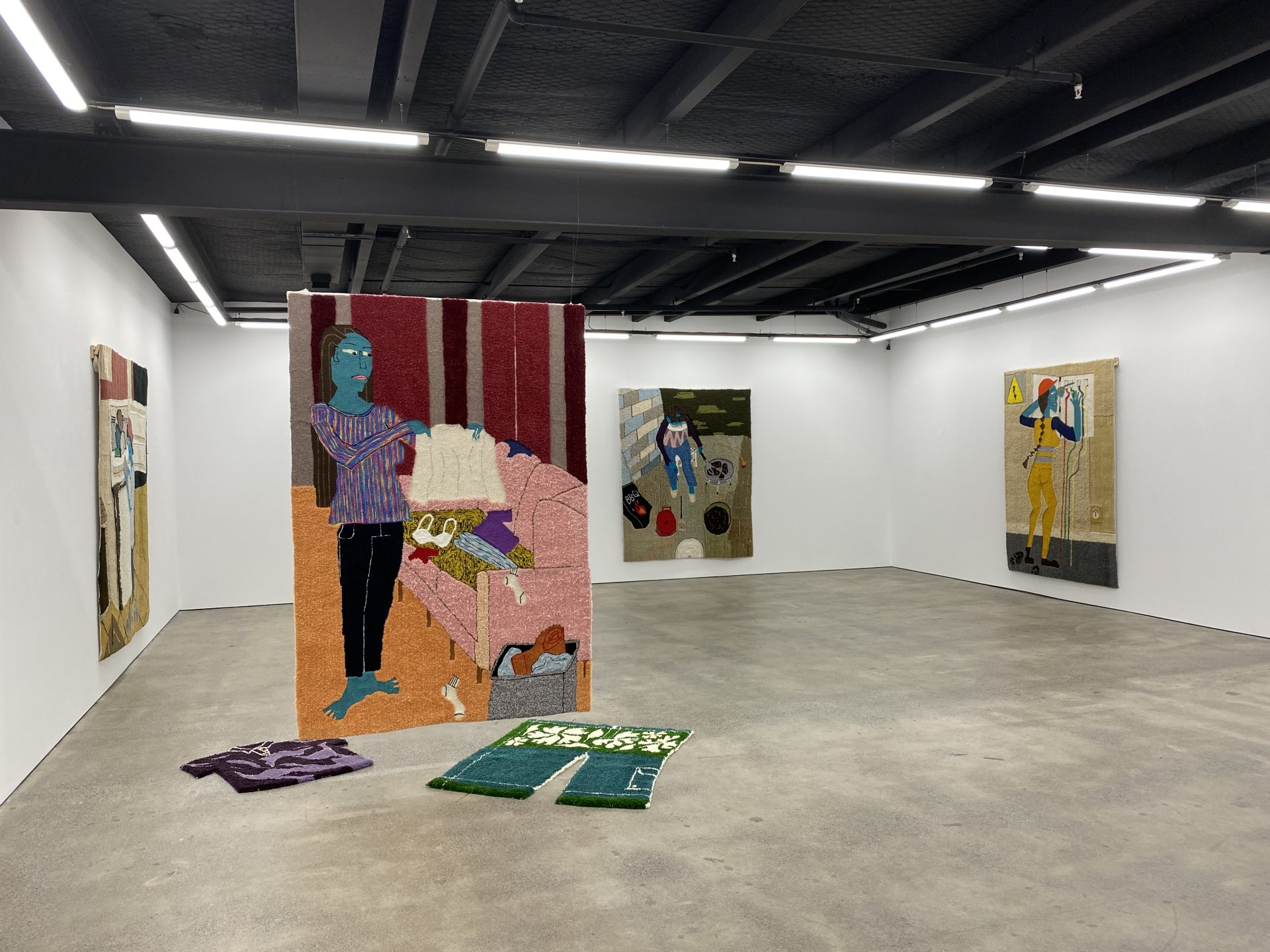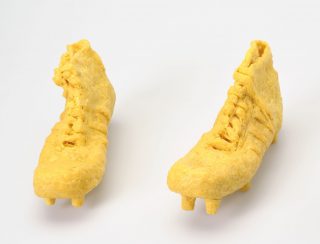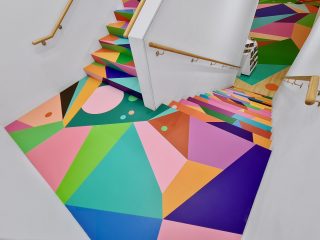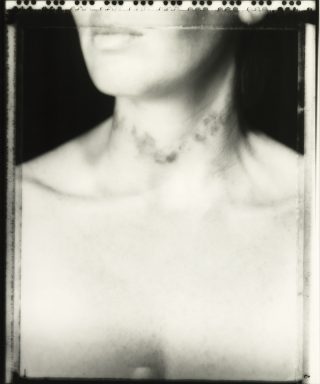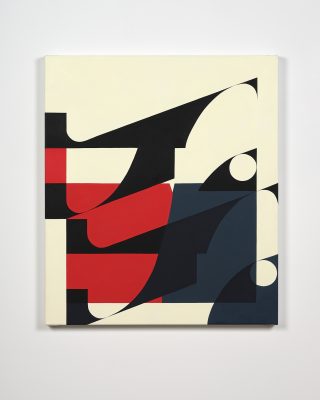In Rugged Heart, Claudia Kogachi uses pictorial rugs to explore family ties and personal anxieties. The show has its roots in the global pandemic. Last year’s nationwide lockdown limited the artist’s access to painting supplies and encouraged her to experiment with new modes of making. She began to create tufted rugs, being attracted to the functional and sensuous aspects of the objects. Although slower and more arduous than painting, the process permitted a degree of mental disconnection. Rugged Heart brings together rugs from three important series, all of which nod towards the pandemic. Uncle Gagi sees Kogachi reflect on the loss of her jiichan (grandfather). She has recreated several of his personal items, including his aloha shirts and board shorts. A piece of clothing can be a powerful marker of its wearer, carrying their scent long after they have passed, and forever evoking their appearance. Kogachi’s rugs serve as monuments, sharing the visual potency and the comforting tactility of her jiichan’s attire, and helping to compensate for her inability to travel to Hawaiʻi, where he lived, and where her obaachan (grandmother) remains.
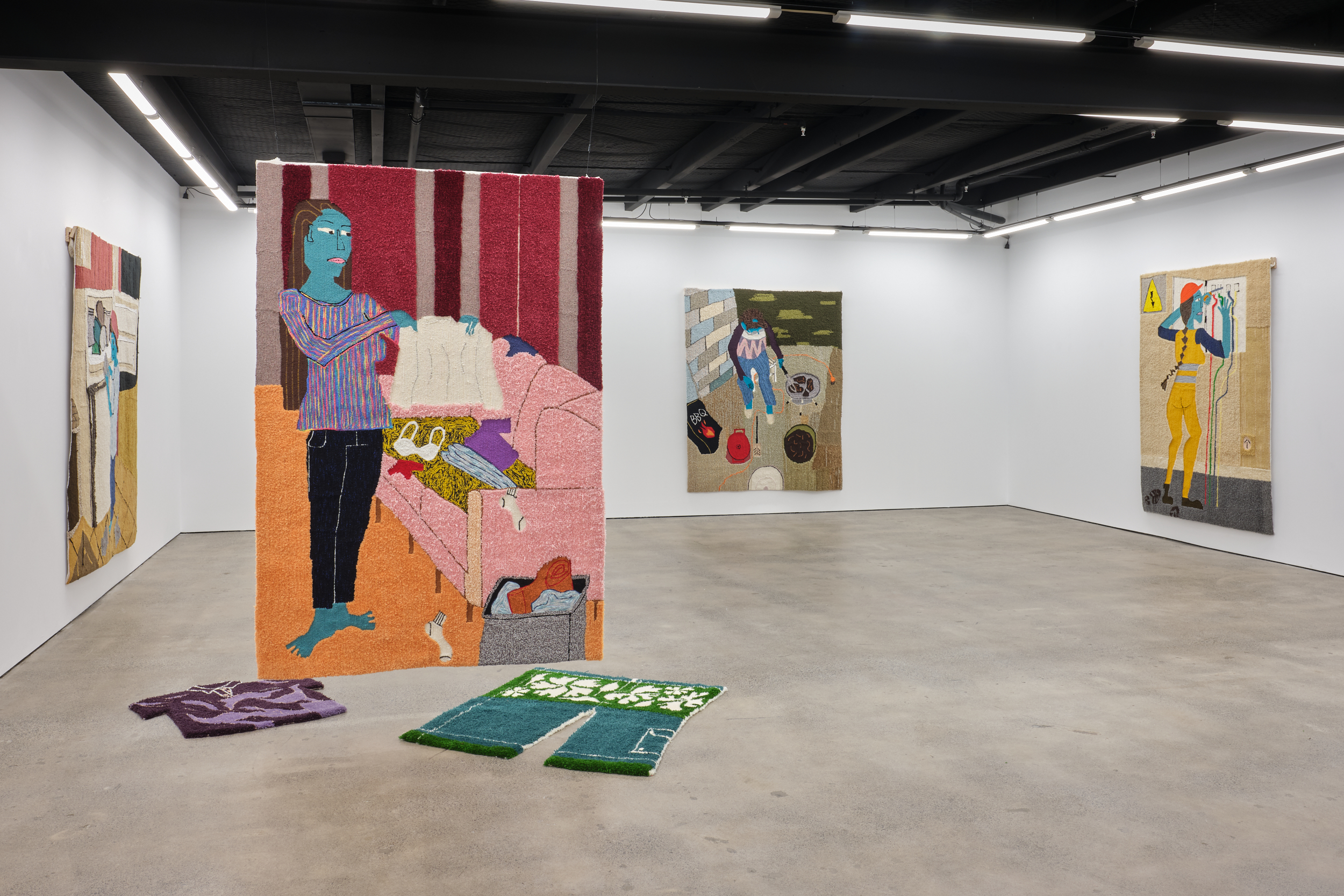
Claudia Kogachi, Rugged Heart (installation view), Visions, Tāmaki Makaurau, 2021. Photograph by Samuel Hartnett, courtesy of the artist.
The series All the Careers I’ve Ever Considered Doing in Order to Finance My Art Career shows Kogachi at work as an electrician, a landscaper, a nanny, and a realtor (this last job is the only one of the four that she has not actually attempted). All are sensible professions that might, in theory, supplement her work as an artist, which cannot help but feel especially precarious during a time of heightened economic uncertainty. The pieces are characterised by quirky angles and proportions, as well as a sense of self-scrutiny. They continue Kogachi’s well-known practice of representing herself and members of her family with blue skin. Early paintings show her and her mother engaging in competitive activities, like boxing and chess, and allude to parent–child friction. In such works, the skin colour connects with the notion of ‘feeling blue’. It also tends to reinforce the pictures’ symbolic nature and broad relatability. The scenes in All the Careers I’ve Ever Considered Doing in Order to Finance My Art Career are more literal, but they, too, are underpinned by widely felt concerns. A great many of us are presently worrying about job security.
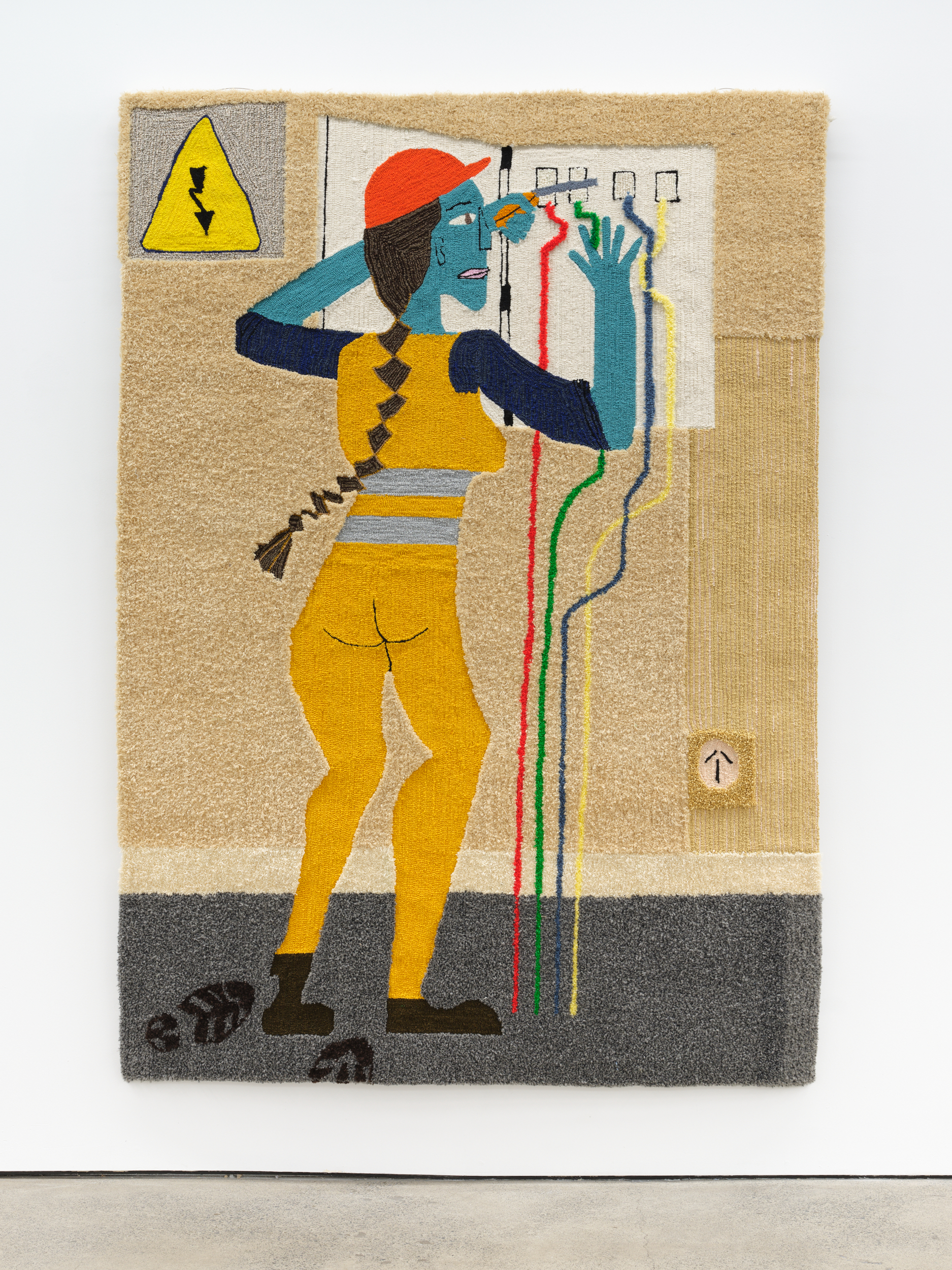
Claudia Kogachi, Sparky, 2020. Photograph by Samuel Hartnett, courtesy of the artist.
Obaachan during the lockdown, Wahiawā, Hawaiʻi, developed with curator Abby Cunnane, further explores Kogachi’s disconnection from Hawaiʻi as a consequence of the pandemic. The three rugs in the suite are based on photographs taken during her most recent visit to her obaachan’s home at Wahiawā (inland on Oʻahu), and show the elderly woman carrying out everyday tasks related to food. She barbecues galbi/갈비(Korean short ribs), cleans out her freezer, and prepares musubi (Spam sushi). (In her text on the rugs, Cunnane discusses the associations of Spam in Japanese-Hawaiian culture.) Elevated viewpoints give the impression of someone keeping an eye on Obaachan. Kogachi is one such person, since she speaks with her grandmother regularly via Skype. Like many of her works, the rugs possess a strong linearity and are limited in detail. The particulars that she chooses to include are highly expressive. Obaachan is depicted with a hunched posture and thinning hair, features that communicate both her frailty and her granddaughter’s tenderness. She is a specific identity but also archetypal—like a character from a cartoon or sitcom.
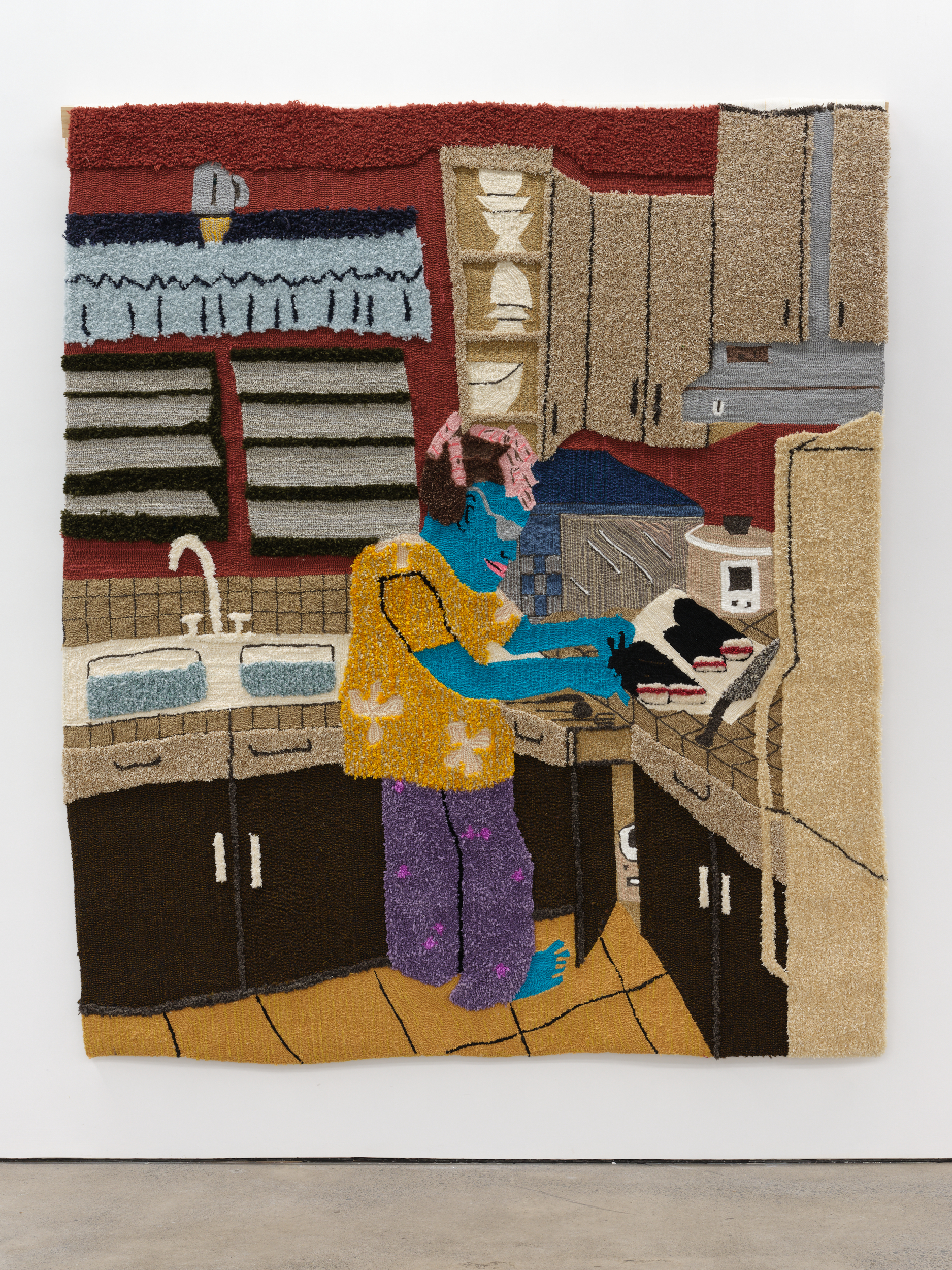
Claudia Kogachi, Obaachan rolling musubi (Spam sushi), 2020. Photograph by Samuel Hartnett, courtesy of the artist.
The emphasis on food and food-related tasks in Obaachan during the lockdown, Wahiawā, Hawaiʻi recalls their importance in the nurturing of familial connections. An everyday meal, cooked and eaten together, can bind us strongly, even when little verbal communication is involved. While the pandemic is preventing Kogachi from directly interacting with her obaachan at present, her rugs are reminders that the two carry out similar activities, more or less simultaneously, despite distance. Kogachi fusses about her own kitchen and makes musubi. She busies her hands with wool, if not a barbecue. Fundamentally, the works support memory, imagination, and future-gazing. The same is true of Rugged Heart as a whole. This is not, of course, to say that the show is predominantly cheerful. The sight of the artist impatiently folding washing in Nanny leaves no doubt that the prospect of doing the job long-term is unappealing to her. Her evocations of her jiichan and obaachan alike are brimming with pathos. Still, there is much humour and hopefulness at play. One suspects that it would take a great deal of treading to keep Kogachi down.
Rugged Heart
Claudia Kogachi
26 March to 24 April 2021
Visions
Tāmaki Makaurau Auckland
